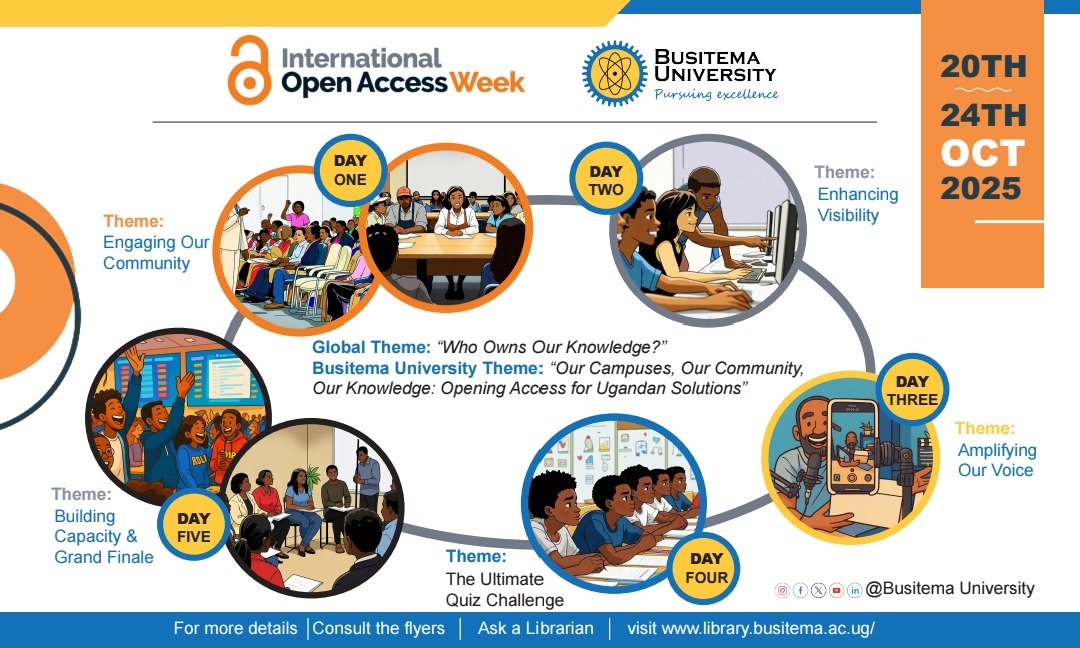Date: Wed, 10/08/2025 - 08:50
ULIA President Champions Evolving Role of Librarians in the AI Age at MUBS Library Week
KAMPALA – The critical role of libraries and the irreplaceable value of librarians in nurturing a reading culture and guiding users through the complexities of Artificial Intelligence (AI) were the central themes of a keynote speech delivered by the President of the Uganda Library and Information Association (ULIA), Dr. Fredrick Kiwuwa Lugya.
Dr. Lugya was speaking as the Guest of Honour at the official opening of the Makerere University Business School (MUBS) Library Week on Monday, October 6, 2025. The event, held…
Continue Reading
Date: Mon, 10/06/2025 - 12:43
International Open Access Week 2025
Open full page

Date: Tue, 09/23/2025 - 06:31
From Germany to South Africa: A Librarian's Journey to Bring New Skills Home
How can a university library stay ahead of the curve in the digital age? This question drove Ms. Glorias Asiimwe, the Faculty of Health Sciences Librarian at Busitema University, on two exciting international trips in 2025 to find practical answers.
Benchmarking Excellence in Germany
In late May and early June, Ms. Asiimwe joined a group of Ugandan medical librarians on a professional study tour to Germany, partially supported by BI-…
Continue Reading
Date: Mon, 09/22/2025 - 10:54
Busitema University Librarian to Champion Libraries' Role at National Open Science Forum
Dr. Fredrick Kiwuwa Lugya, the University Librarian of Busitema University and President of the Uganda Library and Information Association (ULIA), is set to present a key address at the upcoming Uganda Open Science Stakeholders' Meeting. The high-level forum, scheduled for 24th September 2025, will convene at the College of Computing and Information Sciences, Makerere University, in a blended…
Continue Reading
Date: Fri, 09/05/2025 - 10:36
Date: Mon, 07/21/2025 - 10:52
Position: Library Assistant (PU7)
The Library Assistant position at Busitema University Library is an academic, teaching, non-science role designed to support the provision of specialized reference services and contribute to the library's mission of excellence in information services. The successful candidate will play a key role in enhancing user experiences through research, information literacy instruction, and the development of library collections.
About Busitema University Library
Busitema University Library operates a…
Continue Reading
Date: Mon, 02/17/2025 - 08:45
Speech by the President of the Uganda Library and Information Association (ULIA) Delivered at the 24th Consortium of Uganda University Libraries Annual General Meeting, Uganda Management Institute (UMI), Kampala | February 14, 2025. See Details
Date: Mon, 02/17/2025 - 08:37
Libraries are not just repositories of books—they are dynamic hubs of knowledge creation, curation, and dissemination. Today, we explore their historical roots, scientific legitimacy, and indispensable role in academia - Continue Reading
Date: Tue, 12/24/2024 - 17:22
As the calendar year comes to a close, I would like to extend my warmest greetings and reflect on what an incredible year it has been. Once again, we have set a new standard despite the numerous challenges we faced.
We witnessed significant growth in our digital collections and built an integrated and robust technology system to support the discovery, access, and accessibility of all library resources, collections, and services. Additionally, we developed cross-functional library teams to support multi-campus research groups, implemented tools that facilitate the entire scholarly communication lifecycle,…
Continue Reading
Date: Sun, 12/15/2024 - 14:41
It is important that you help us curb bad driving on our roads. In case you spot poor driving by any of the Government Ministries Departments or Agencies, please report!. Click here for full video
In case of an emergency on the road or to report a bad driver!
call toll free
☎️ 0800199099 (Toll Free)

